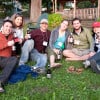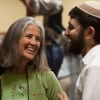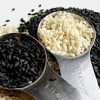by Leora “Leo” Cockrell – Camp Tawonga – San Francisco, CA I arrived on playa for my first Burning Man at midnight on Sunday after eight hours of driving. I got out of my car and I was immediately aware that I had absolutely no bearings. Nothing about this landscape, these people, these structures, or flashing LED lights was familiar, and in a sense, I was no longer familiar to myself. After calibrating my body to the harsh environment and exploring for a few days, I decided to check out the Jewish Theme camp – Milk and Honey. On Thursday morning, Milk and Honey held Torah study and we explored the feelings of unfamiliarity in this particular landscape. We discussed how in Hebrew the word for “Desert” and “Wilderness” is synonymous and wondered if this was because the desert was the only wilderness known at the time of writing the Torah, or if the Desert holds a wildness unique unto itself. We discussed the story of Moses and his discovery of the burning bush in the desert – both how it took his initiation of awareness and curiosity in the bush for G-d to then reach out to him, and […]
Tag Archives | Shabbat

What’s Happening on Shabbat at the New York Ride
We’re excited to announce a small taste of opportunities at this year’s Hazon New York Ride Shabbat retreat

How do you squeeze 613 dinners into 50 Shabbats?
Learn about the 613+ Shabbat Dinners project created by Congregation Beth Am in Baltimore

Rejuvenating Ourselves and Our Planet
Jewcology is a diverse platform for Jewish environmental activists to learn from each other in order to educate Jewish communities about our responsibility to protect the environment. Hazon is excited to share these resources with you! We promote the interrelatedness of shabbat as a time to reflect on environmental and sustainable ideas through many of our programs and resources. Our Food Guide has kosher sustainable meat options, Greening Your Shabbat Table, Sustainable Kiddush, and all of our Food Programs help you to draw connections between Jewish tradition and contemporary food issues. By Rabbi Yonatan Neril In modern society, we are running, speaking, and thinking at an exceptional rate, and oftentimes we continue all week long without slowing down. Constantly doing, always mobile accessible, habitually multi-tasking. If being too busy is a malady of modern man, slowing down on Shabbat may be a key remedy. The Torah teaches, “These are the things that the Divine commanded to make. Six days work may be done, but on the seventh day you shall have sanctity, a day of complete rest to G-d…” Achieving sanctity and complete rest is the stated goal of Shabbat. Yet how can this happen? (more…)

First Fruit Challah for Shavuot
In ancient times, the challah eaten on Shavuot was the first taste of the new year’s wheat.

Shabbat Step by Step
Hosting Shabbat While Living a Full Week Sunday, April 29 at 11:30 AM to 2:00 PM Sur la Table Portland’s Culinary Kitchen Classroom 1102 Northwest Couch Street, Portland, Oregon (more…)

The Jew and the Carrot Round Up – 1/17/2012
Happy New Year from Hazon and The Jew and the Carrot!

What Would Noah Do? Shabbat Parshat Noah and A Global Climate Change Campaign (10/9 – 10/10)
10/10/10 is a globally acknowledged date to help bring awareness to the significance of climate change. It is all too appropriate that Shabbat Noah falls out on the same weekend. Our Shabbat and day of action is in participation with the 350.org campaign, an international effort that’s building a movement to unite the world around solutions to the climate crisis. August 23, 2010 By Dr. Mirele Goldsmith, environmental psychologist and sustainability consultant. Noah was 600 years old when God told him to build the ark. How the hell did he do it? We really don’t know. The Torah doesn’t say how Noah built the ark. It just says that God told Noah he had 7 days to get it done. And he did. What’s the message for us today? Why have we chosen the Shabbat when we read the story of Noah as the day to commit ourselves to take action on climate change? Because if Noah could do it, so can we. (more…)
Green with(out) Envy: Struggling with the Tenth Commandment
Rabbi Yedidya (Julian) Sinclair, Hazon Rabbinical Scholar and Cofounder of Jewish Climate Initiative On Shavuot morning next Friday, in synagogues around the world, we will read the Ten Commandments. It’s remarkable, when you think about it, what a success they’ve been. Over the past 3000 years the Jewish people has done an extraordinary marketing job on conveying these basic ethical and spiritual laws. Across the Western world today they are acknowledged as axioms of civilized life. Well, mostly. My friend (Hazon Rabbinical Scholar) Steve Greenberg likes to qualify that success as follows. “We Jews have done a pretty good job in delivering nine and a half out of the Ten Commandments to the world. The half that we have delivered is the side of Shabbat that is about employment; the universal right to have one day off work each week. The half that we haven’t is the part of Shabbat that is about refraining from shopping, driving, flying – the part that deals with our relationship to the created world. We need to deliver that half of the Shabbat commandment to the world now.” Rabbi Steve makes an important and timely point. Shabbat is a precious spiritual and ecological resource. […]
Shabbat Hazon 2006
Friday July 28th 2006 / 3 Av 5766 Dear All, This Shabbat is Shabbat Hazon, which you would think would be the sort of time I ought to write something to our list. But then one recalls that Shabbat Hazon is not about “hazon” – vision – in a positive and inspirational sense (which is largely why Hazon is called Hazon) but rather about a prophecy of destruction and despoliation, especially in Israel. And then I think: well, perhaps I should indeed write something… (more…)
2005 New York Ride Keynote Address
by Ariana Silverman This summer, my uncle, a middle-aged working father of three, volunteered to be a Little League Umpire. As many of you know, the difficulty of this particular job is not the physical exertion, or the danger of being confronted by a player, or even that there are that many pitches that are too close-to-call, but having to face the genuine wrath of a parent who feels that his or her child, or even his or her child’s team, has been wronged. During one particularly heated game, my uncle’s calls were repeatedly followed by yelling from an offended mother in the stands. Trying to keep his cool, when, in the middle of the forth inning, she asked for the count, he obligingly held up his hands . My uncle was stunned by her temporary silence, and then it came: “Ump, you’re gonna hafta yell-out the count-I don’t have my glasses on!” Tonight I invite you to join me in a conversation about seeing. Our Torah portion this Shabbat begins with the command to see: Re’eh. Re’eh Anochi Notein L’ifneicheim HaYom Bracha U’klalah. See, this day I set before you blessing and curse (Deuteronomy 11:26). This theme is not […]



